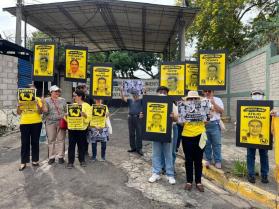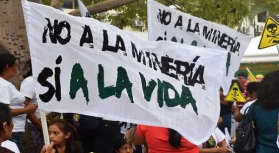El Salvador's 2019 Presidential Elections Approach
Campaign season for El Salvador’s 2019 presidential elections began on October 2, following the Supreme Electoral Tribunal’s official convocation of the election for February 3. The following morning, the governing leftist party, the Farabundo Martí National Liberation Front (FMLN) officially launched its campaign, “With the Strength of the People.” At dawn, FMLN members gathered to accompany Presidential and Vice-Presidential candidates, Hugo Martínez and Karina Sosa as they visited street and market vendors across the capital. As Martínez told the media, “We’re here to give our backing to the people, to the ones who can guarantee our victory. While others are sleeping, we are out here supporting.”
The comment was a rebuke to anyone who assumed that the governing FMLN party had given up in the face of the ascendancy of an independent rival, Nayib Bukele, the former FMLN mayor of San Salvador who was removed from the party in 2017 for ethics violations and is now running for president in coalition with the right-wing Grand Alliance for National Unity (GANA) or the widespread media appeal of the young business magnate and philanthropist, Carlos Calleja, who is trying to put a moderate face on the arch-right Nationalist Republican Alliance party (ARENA).
Though the right-wing opposition in El Salvador and powerful allies in the US have unceasingly hammered away at the FMLN, the party delivered a powerful demonstration of its continued staying power in September, when over 50,000 FMLN members and supporters filled the largest stadium in Central America for the party’s annual Convention.
Furthermore, a number of organizations and community leaders, including among the Salvadoran diaspora in the United States, who helped form Bukele’s “New Ideas” movement-turned-political party, have renounced their support following his decision to run with GANA, a party with deep ties to former president Antonio Saca, who recently confessed to embezzling $300 million while in office. At an event with Salvadoran community leaders in Washington, DC, for example, former New Ideas enthusiasts like Roy Campos endorsed Hugo Martínez. As Campos said, “I have followed the career of Hugo Martínez and he is the most capable person to lead our country. He has not run from party to party to see where he can establish himself... We cannot allow the right to lead our country ever again.”
Joining the crowded field of candidates is Josue Alvarado from the newly established VAMOS party whose slogan is, “The Party without a Past.” Most of their support lies with Salvadorans living outside the country; VAMOS has consistently polled at around 1%.
At the first presidential debate, Martínez elaborated on some of the key proposals in the forthcoming Plan of Government, which was developed through a formal process of consultation with the population and different social and economic sectors. He announced was that while the pillars of development, namely, education, health, nutrition and infrastructure, would remain similar to previous FMLN administrations, he would initiate a shift away from the capital and towards “the periphery and localities that have been forgotten.” According to Martínez, the area in most need of this sort of territorial decentralization is higher public education. The University of El Salvador, based in the capital city of San Salvador, is currently the only public university in the country.
On the issue of security, he pledged to continue the ‘Safe El Salvador Plan’ drafted by the Sánchez Cerén administration in consultation with civil society organizations, churches, the business sector, the United Nations, and more. He also promised to continue existing efforts to expand access to electricity and potable water, referring specifically to El Salvador’s new clean energy transformation, which has enabled some communities to start using use solar and other forms of renewable energy rather than waiting for the establishment of new electrical supply lines. He promised that all these efforts would be undertaken by a presidential cabinet split evenly between men and women.
The FMLN chose a congresswoman Karina Sosa, who currently serves as president of the Foreign Relations Commission in the Legislative Assembly, to run as their Vice-Presidential candidate, the first time a woman has been chosen for this position. The principal right-wing opposition party, ARENA, also selected a woman to run as Vice-President, economist Carmen Lazo, signifying a long-awaited shift in the Salvadoran political arena.
Some things, however, have changed little, including open endorsements from US Republicans for ARENA’s presidential candidate and State Department hostility towards the FMLN. Florida Senator Marco Rubio is thus far leading the pack, meeting with and publicizing his endorsement of ARENA candidate Carlos Calleja on social media. Rubio, a right-wing Cuban American, was indignant that El Salvador established diplomatic relations with China earlier this fall, co-introducing an amendment to “restrict funding” to El Salvador in retaliation. Meanwhile US Ambassador Jean Manes and other State Department officials have reiterated threats to “re-evaluate” US-El Salvador relations as a result of the decision.
CISPES is leading a campaign to confront these and any other forms of US intervention in the 2019 Presidential elections. Learn more about our election observation mission here.

 "I am a CISPES supporter because continuing to fight for social justice and a more people-centered country means continuing the dream and sacrifice of thousands of my fellow Salvadorans who died for that vision.” - Padre Carlos, New York City
"I am a CISPES supporter because continuing to fight for social justice and a more people-centered country means continuing the dream and sacrifice of thousands of my fellow Salvadorans who died for that vision.” - Padre Carlos, New York City

